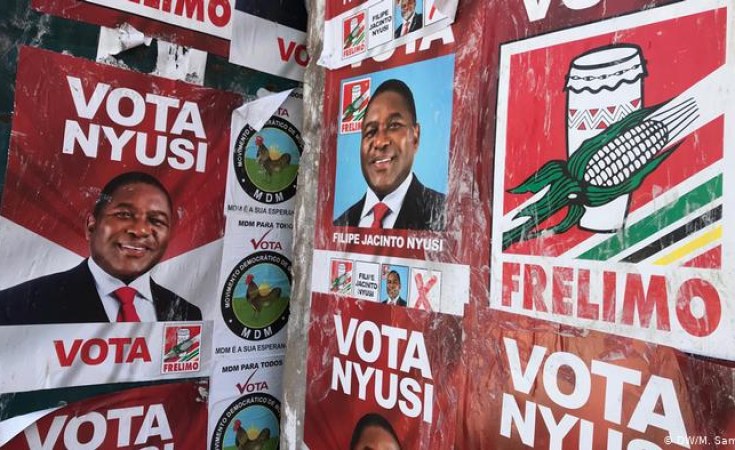When it rules on the results, the Constitutional Council is unlikely to jeopardise President Nyusi's bid to consolidate power.
The National Electoral Commission declared Mozambique's ruling party FRELIMO the winner in 64 out of 65 municipalities participating in the country's sixth local elections on 11 October. The Constitutional Council must still validate the results - and in the meantime, they're being contested by the main opposition party RENAMO, who labelled the outcome a mega-fraud.
On 15 October, mass demonstrations in several towns were called by RENAMO's president, Ossufo Momade, to repudiate the results. The protests were met with heavy-handed policing, which has led to widespread post-electoral violence.
There is clear evidence that electoral bodies changed the results to benefit FRELIMO in towns where the opposition had won. The results showed a surprising victory for the ruling party in Maputo, Matola, Quelimane, Vilankulo, Nampula and Chiure - towns where the interim count at the polling stations gave victory to RENAMO.
The third largest party in Mozambique, Movimento Democrático de Moçambique, was declared the winner in Beira, while RENAMO apparently got no votes. Parallel tabulations by an independent electoral observation consortium showed that RENAMO in fact won five municipalities, including the capital Maputo and Mozambique's largest city, Matola.
Independent election observation groups, the main religious denominations and Mozambique's main partner countries, including Norway, the United Kingdom, European Union, United States, Switzerland and Canada, have expressed concern. They have called on the courts to decide the appeals lodged by the opposition with impartiality, transparency and without fear.
There is clear evidence that electoral bodies changed the results to benefit FRELIMO
In times of institutional crisis, the judiciary can help preserve democracy and slow the march of authoritarianism through executive manipulation. A dozen district courts decided to annul some districts' election results or have the vote repeated or recounted, granting the opposition's request.
In one case, a Maputo court declared that a local election commission falsified the results sheets, favouring FRELIMO's victory. Then Judge Cecília José ruled that the vote be recounted in 64 polling stations which have over 86 000 registered voters. This would force the elections to be repeated, benefiting the opposition. The court ruling proves that the electoral bodies are leading the rigging to benefit the ruling party, as independent observers and the opposition have always claimed.
The court evidence of massive fraud could lead to reforms that give electoral bodies some independence in the 2024 general polls. Without that, government risks losing Western donors' election funding.
However, all the district courts' decisions to repeat elections and vote counting were overturned by the Constitutional Council on the grounds that only the council can annul elections or order a repeat count. This led RENAMO to continue its protests, mobilising thousands of people, mostly youth. In cities across Mozambique the police responded violently to the peaceful marches, firing tear gas grenades, water jets and at times automatic rifles.
In RENAMO's urban strongholds of Nampula, Nacala and Chiure, and in Maputo - where protests against the government and election rigging were particularly strong - demonstrators reacted to police repression with violence. They barricaded roads, setting alight tyres and rubbish bins.
All district court decisions to repeat elections and vote counting were overturned by the Constitutional Council
The police have increased their aggression towards demonstrators, shooting to kill. Although official police accounts omit the deaths, reports by human rights organisations and the media detail cases of at least four citizens killed by police gunfire in Maputo, Nampula, Chiure and Nacala.
In Maputo, police raided RENAMO's headquarters and arrested dozens of young supporters without a warrant. The detainees remained in police custody for days without being brought before a court, imprisoned in inhumane conditions.
Momade accused President Filipe Nyusi of wanting 'to force RENAMO to resort to war,' so that Nyusi could 'perpetuate himself in power.' From 2011 to 2016, RENAMO used violence as a tactic to claim electoral results. The 2019 Maputo Accord ended the conflict and led to the disarmament and demobilisation of RENAMO rebels. The opposition party doesn't have the military capacity to start an armed conflict, at least in theory.
As Nyusi's second term comes to an end, there are rumours that he tried unsuccessfully to change the constitution to secure a third. It's possible that he might use post-election political instability to postpone next year's presidential elections. However, there is much more at stake than a third term. The end of Nyusi's governance cycle opens space for succession struggles within FRELIMO, with various factions keen to influence the election of FRELIMO's next candidate.
Nyusi and his faction want to use the outright local election 'victory' to consolidate power in FRELIMO
There is an understanding that Nyusi and his faction want to use the (almost) 100% 'victory' in the local elections to consolidate power within FRELIMO. This would allow them to control the meeting that elects the party's presidential candidate - scheduled for the first quarter of 2024.
The trend of winning 100% began in 2019, when Celso Correia took over as head of Nyusi's electoral office, and his right-hand man. In that year's presidential polls, Nyusi was re-elected with an astonishing 73%. FRELIMO won in all of Mozambique's more than 150 districts and provinces, and elected all the 10 provinces' governors.
The pattern continued in 2022, when Nyusi was re-elected FRELIMO leader with 100% of the vote. So, in the 2023 local elections, the president and Correia are again chasing the complete target, and have so far achieved 98.5%.
If the institutions of justice, particularly the Constitutional Council, approve the results, they will be seen as succumbing to the march towards authoritarianism. In the 2024 presidential, legislative and provincial governors' elections, FRELIMO will seek a 100% victory and the reduction of the parliamentary opposition to a negligible minimum in the name of multiparty democracy.
Borges Nhamirre, Consultant, ISS Pretoria


